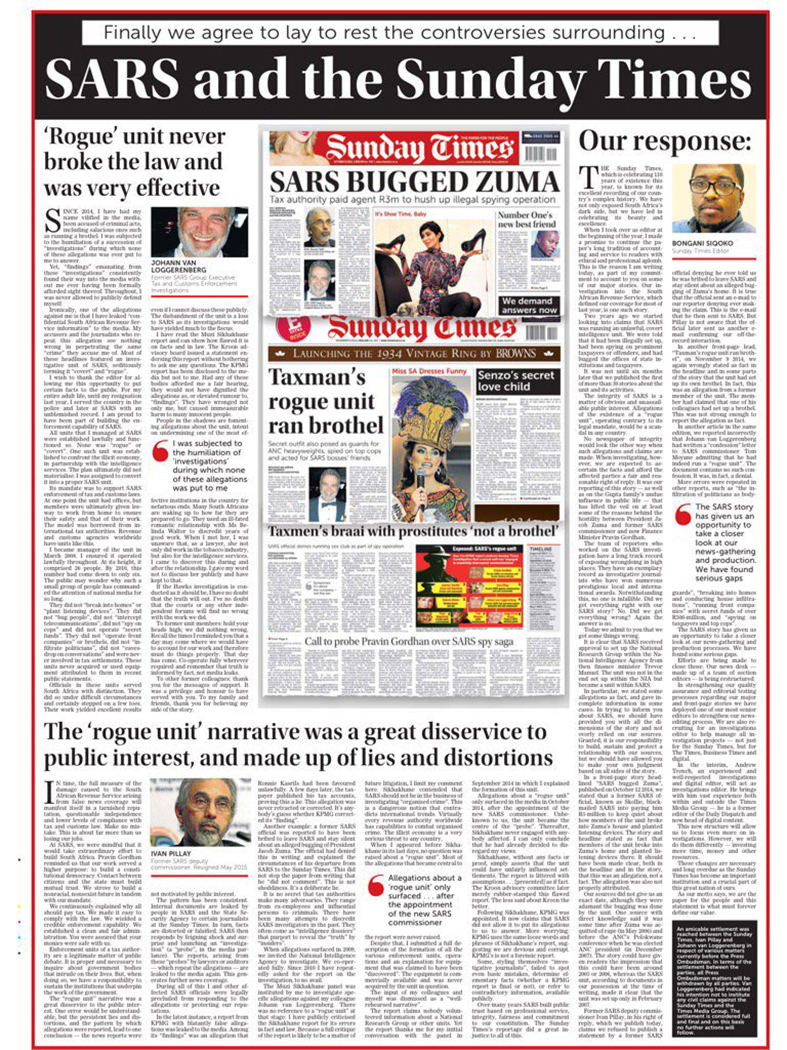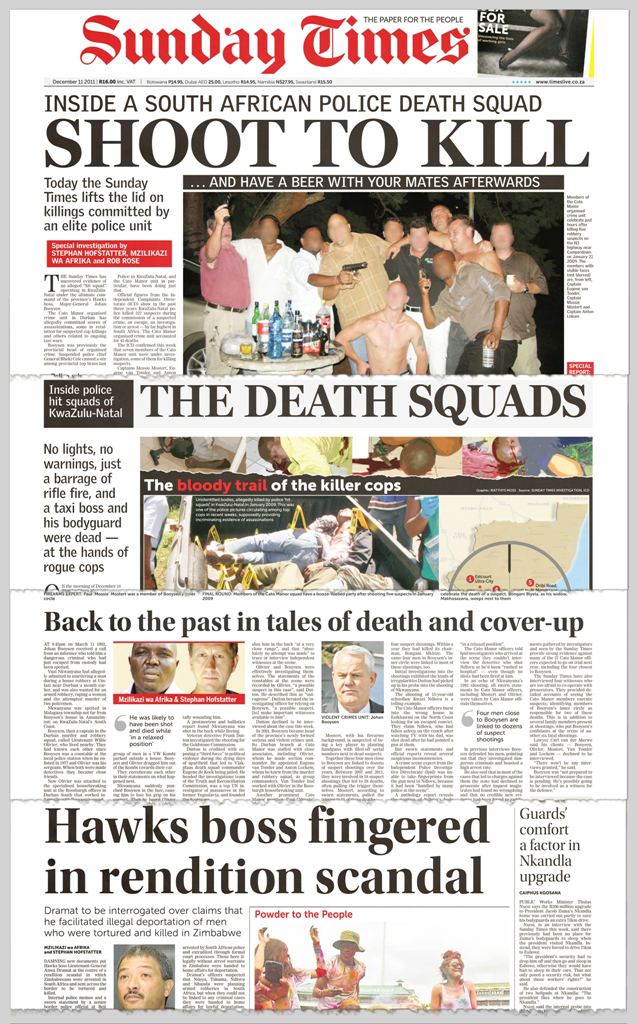The Hawks were told to drop the investigation into crime intelligence boss Richard Mdluli. (Cornel van Heerden/Gallo Images/Foto24)
FAKE NEWS
My friends and colleagues know that I’m addicted to sport shooting. I neither drink nor smoke. In fact, I don’t even drink tea or coffee. So, a trip to the shooting range is the best way for me to unwind.
When I planned a meeting with a certain major general from the Hawks, who had been dismissed from the South African Police Service, I suggested we meet at the shooting range. I wanted him to let off some steam from the pressures of unemployment. I had last seen him a few years before when we both worked at the Hawks.
He arrived driving a beat-up Toyota Conquest. Although he had his usual smile, his face told a story of a man who was in a lot of pain from what he was going through — he had been fired for a discrepancy in his travel allowance claims. He had also lost a lot of weight.
He asked me why I thought I was fired from the Hawks. I was fired for a tweet, I replied. You are very naive was his quick response. He then explained that a decision had been taken very high up to get rid of the Hawks’ leaders. I was a strong spokesperson, he said. I was going to be an irritation defending my bosses when they were dismissed. So you had to go first, he told me.
The conversation about an instruction from high up to get rid of me reminded me of a discussion I had had with a friend after I was dismissed. He advised me to go to a certain homestead and apologise, and assured me that, after this, all my problems would be solved. I was broke and isolated, but I declined the offer. I didn’t know what I had done to warrant having to make an apology to a powerful politician. He couldn’t give me a reason when I asked.
The major general’s sin was to get too close to powerful politicians during his investigation into allegations of corruption in the building of the Mbombela stadium in Mpumalanga.
We started seeing negative articles about him in newspapers. After I was pushed out, disciplinary charges against him followed and a dismissal sealed his fate. This was a modus operandi that was becoming all too familiar. A combination of negative media articles peddled from certain sources in police crime intelligence, who had powerful political backers, and useful idiots in the police service, who were always ready to institute a disciplinary process or criminal charges, followed by a dismissal.
It did not become immediately clear to us while I was at the Hawks that we were caught up in a powerful vortex that was to be infamously known as state capture. The aim was to hollow out the Hawks and make some investigations go away. I remember the moment when the retaliation against the investigations we were conducting became very intense.
My boss came to me and spoke in his usual calm voice. He told me it seemed some suspects in our investigations were more important than others. When I asked what he meant, he told me that we had received an instruction to drop the criminal investigations against crime intelligence boss Richard Mdluli. I asked him what he thought, to which he replied that we had to do things right. We agreed that the instruction was going to be ignored.
It must have been some months after this that then Hawks head Lieutenant General Anwa Dramat called me early on a Saturday morning. He told me that he had received questions from the Sunday Times that needed urgent attention. When I arrived, a team of senior officials was already in the office. The Sunday Times had allegations that Dramat and Gauteng Hawks boss Major General Shadrack Sibiya had presided over the illegal rendition of suspects from Zimbabwe.
We spent several hours trying to educate ourselves and putting questions to Cowboy Maluleke, who was implicated in handing over the suspects to Zimbabwean authorities. Dramat, Sibiya and Maluleke were in essence being accused of sending suspects to Zimbabwe to be killed.
 The Sunday Times ran stories about a police death squad, which was false. The author says he gave them information but it was ignored.
The Sunday Times ran stories about a police death squad, which was false. The author says he gave them information but it was ignored.

By the end of the meeting, we were assured that there was no truth in the allegations. I assisted the Sunday Times’ Mzilikazi wa Afrika, Stephan Hofstatter and Rob Rose with the correct information. But when I read the front-page article a day later, I was dismayed to discover that they had ignored the information I had given them. I called Rose to point this out, and I was immediately dismissed.
It was the same attitude I encountered during the series of articles into the so-called Cato Manor death squad. Major General Johan Booysen and I would spend time during which he would educate me on the facts, which I then passed on to the Sunday Times investigative reporters.
I knew that there were powerful forces at play who were feeding the reporters false information. But what I never understood was why the Sunday Times reporters and others who followed up on the articles chose to ignore the facts we offered to them. I know that sometimes journalists fall in love with a certain narrative and find it hard to divert from it. But these were not rookie reporters.
The Sunday Times team was being “run” by crime intelligence. Elements in the unit had chosen the team to feed them what appeared to be legitimate information to destroy the lives of their perceived enemies. I, however, don’t understand why all the processes in the newsroom that are there to test and corroborate the information being given failed to trigger the red flags. These were everywhere.
I also know of three journalists who were paid. One of the journalists on the take once had an interview with Sibiya, during which I was present. All he wanted to know was the location of the evidence room containing documents in the investigation against Mdluli. It was abundantly clear that, because of the specific language he used, he was being coached by someone in the police and that he had been sent to obtain this information for the venue to be possibly broken into and for evidence documents to be stolen to make the investigation disappear.
I have tracked the three over the years since obtaining their names, and I was dismayed when two of them took up powerful position in newsrooms — one in Durban and the other in Johannesburg. The third one faded away from the media in 2015. If called upon by a competent forum to reveal their names, I am prepared to do so. The Press Council, assisted by the South African National Editors’ Forum, can establish such a platform.
I’m a former journalist. It’s a profession I still hold dear. I grieve because of the devastation that has been visited upon the craft. The apology from the Sunday Times is important, but it is not enough. Sibiya, Dramat and others lost their careers because of character assassinations conducted through the media, accompanied by well-timed, trumped-up charges and dismissals. Some of my former colleagues have lost their livelihoods and are in financial ruin. An apology can never fix their lives.
I also take no joy in the fall of Wa Afrika, Hofstatter and others, who are still to experience the same because of this sordid saga. It should never have happened.
McIntosh Polela is a former Hawks spokesperson and the author of the memoir My Father, My Monster. He is a stakeholder relations manager for a government investment agency